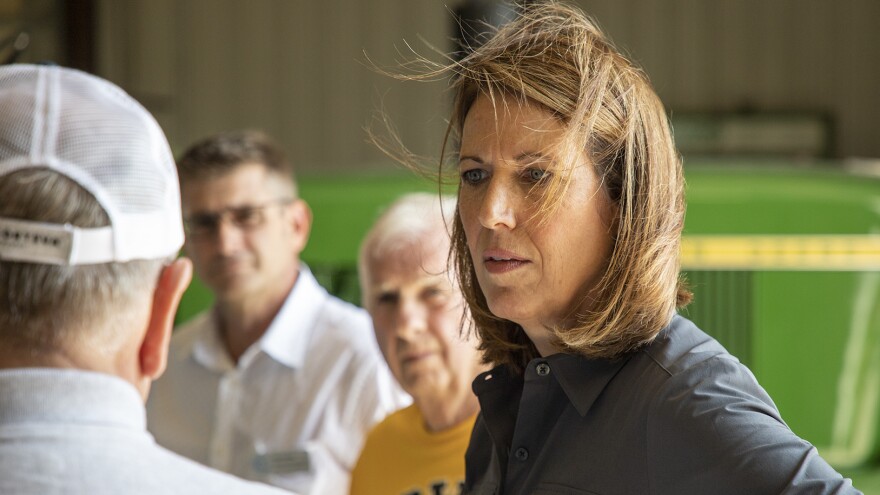Farmers in the rural Midwest say they are struggling because of President Trump's ongoing trade war and a recent decision the president made on renewable fuels made from corn and soybeans that benefits the oil industry.
"We're tightening our belt," farmer Aaron Lehman says while driving his tractor down a rural road near his farm north of Des Moines, Iowa. "We're talking to our lenders, our landlords [and] our input suppliers."
Lehman, the president of the Iowa Farmers Union, says his members say they're trying to find any way to cut costs just to make ends meet. He says they're concerned about the escalating trade war.
"Instead we chose to insult our trade allies, pick all sorts of fights with our trade allies," Lehman says. "And then go to China and make outrageous demands that we knew were not going to be met."
The Trump administration has doled out billions of dollars in relief to farmers for taking the brunt of the trade war. It's an economic short-term positive deal to fill a gap, but it doesn't fix a long-term problem of not having access to foreign markets.
We lifted the restrictions on E-15 just in time to fuel America's summer vacations. We just made it.
Back in June, Trump came to Council Bluffs, Iowa, with an announcement meant to calm those concerns. His administration cleared the way for higher blends of corn-based ethanol. Forty percent of the United States' corn crop goes to ethanol production.
"We lifted the restrictions on E-15 just in time to fuel America's summer vacations," Trump said to cheers in Council Bluffs. "We just made it."

Iowa Sen. Joni Ernst and Iowa Gov. Kim Reynolds, as well as Nebraska Sen. Deb Fischer and Nebraska Gov. Pete Ricketts, joined the president for the ceremony in Council Bluffs.
The president has also granted dozens of waivers to oil refineries exempting them from blending ethanol. That's leading more than 15 ethanol plants to close their doors. Trump recently tweeted he would be unveiling a "giant package" that would help these farmers.
Bloomberg reported Friday that Trump has agreed to a tentative plan to offset the waivers, but nothing has been announced.
Iowa Democratic Congresswoman Cindy Axne, who faces a tough race for her seat next year, says she'll believe it when she sees it.
"He said he's the best thing that's ever happened to farmers, and literally two months later had his finger on issuing waivers to Exxon and Chevron, multibillion-dollar companies."

While Lehman didn't vote for Donald Trump in 2016, Iowa soybean farmer Dave Walton did.
"We can only talk so much before we have to take action, and he took action," Walton said. "We really saw this coming. He campaigned on it, so it's no surprise."
Walton admits that the negotiations have gone on longer than he thought they would and that soy biodiesel has also been affected by those refinery waivers.
"My vote's still up for grabs," Walton says about the 2020 presidential election.
Economist Ernie Goss at Creighton University says his research shows that the president's trade policies are shrinking the rural economy. Goss oversees a monthly survey of rural bank CEOs in the Midwest and Plains.
Seven out of 10 of the bankers he surveyed support either continuing with the tariffs or in some cases raising the tariffs, Goss said. "Their belief is that the long-term gain will outweigh the short-term pain."
The agriculture economy was already struggling, and the trade war is insult to injury that won't be solved overnight, says Iowa State University agriculture economist Chad Hart.
"Trade negotiations, especially in the case of the wide-ranging issues we have with China, take years to get down to a final agreement," says.
That anxiety is something that Democrats running for president — like Joe Biden — are talking about in Iowa.
Last month he was asked what he'd say to farmers who are hurting from the tariffs but still want to see Trump making these deals.
"Well, if you think that's a good deal, then vote for Trump then," Biden told a group of reporters after a campaign stop in Prole, Iowa. "But I don't think there are that many farmers that are that slow about things."
Democrats are hoping to peel off some of Trump's support. Its high hopes in swing states like Iowa, which went to the president by almost 10 points in 2016.
Copyright 2020 Iowa Public Radio News. To see more, visit Iowa Public Radio News. 9(MDAwMzY5MzE4MDEzMTE3ODg5NDA4ZjRiNg004))


